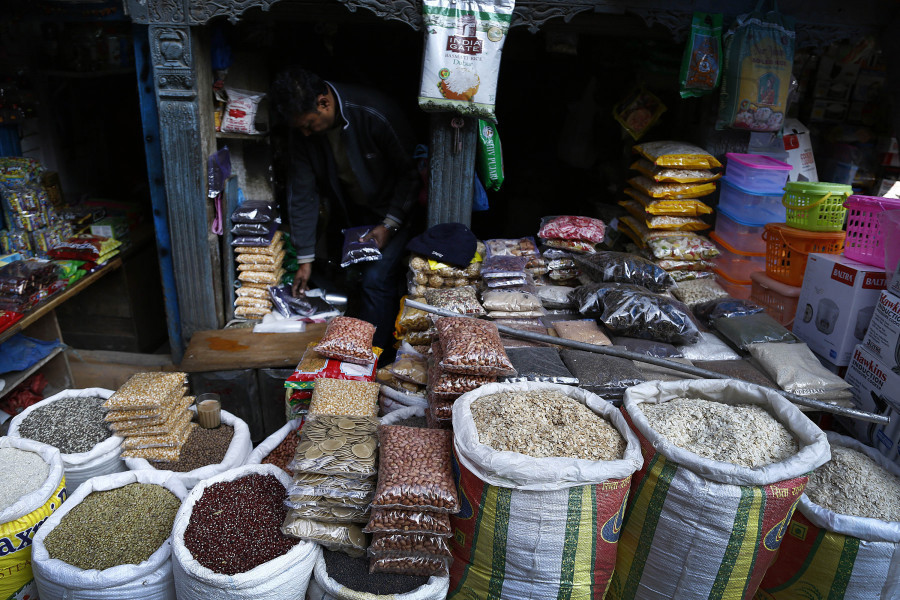Money
Prices of basic kitchen ingredients surge ahead of Tihar buying rush
The proliferation of market offences is due to the government's weak inspection system, activists say.
Krishana Prasain
Prices of basic kitchen ingredients like edible oil, sugar, legumes and lentils have surged by 10-12 percent on the eve of Tihar, with consumer rights activists putting the blame for the sudden rise on opportunistic traders trying to cash in on the festival buying rush.
The retail price of sunflower oil, which used to cost Rs160 to Rs200 per litre depending on the brand, has risen to Rs185 to Rs240, said Raj Kumar Shrestha, president of the Nepal Retailers Association. Soybean oil now costs Rs150 per litre.
According to him, the price of edible oil has increased by Rs15 to Rs20 per litre. Sugar has gone up to Rs90 per kg from Rs80, and lentils and legumes have also increased by Rs10 to Rs20 per kg.
Sanjay Phuyal, proprietor of Aasma Enterprises, a wholesale supplier of food items, said that edible oil manufactured by domestic factories was being exported to India, leading to a shortage in the domestic market. “The price of edible oil surged by Rs10 per litre in 10 days,” he told the Post.
Nepali manufacturers are exporting finished oil to the Indian market to get more profit, said Madhav Timilsina, president of the Consumer Rights Investigation Forum.
Traders also import dried beans and re-export them to India for a big profit, said traders.
According to retailers and wholesalers, edible oil, sugar, lentils and legumes have become dearer within a week.
Consumer rights activists said that since demand for edible oil and sugar soars during Tihar as people buy them to make ‘sel roti’ and other sweets and to light oil lamps, traders are taking undue advantage by hiking prices. The proliferation of market offences is due to the government's weak inspection system, say activists.
Retailers said that dried green peas that were being sold at Rs125 per kg a week ago now cost Rs140 per kg. Dried white peas that were being sold at Rs70 to Rs80 per kg now cost Rs90 to Rs100 per kg. Retailers are paying Rs80 per kg to wholesalers these days, said Shrestha.
Similarly, the price of lentils has swelled from Rs150 to Rs170 per kg. Dried black-eyed beans that cost Rs130 per kg now cost Rs140 per kg; and dried beans have also become dearer.
Shrestha said that wholesalers accuse importers of hiking prices and not even providing a bill of sale.
According to Brajesh Kumar Jha, chief of Salt Trading Corporation, the state-owned company has imported 5,000 tonnes of sugar and distributed it to dealers in the Kathmandu Valley for Rs77.20 per kg. Another shipment of 5,000 tonnes intended to be sold during the Tihar festival is on the way, he said.
The price of sugar would not have gone up if Salt Trading and Food Management Trading Company had imported the product on time, Timilsina said.
The Ministry of Industry, Commerce and Supplies had recommended importing 50,000 tonnes of sugar, but the Ministry of Finance gave its approval for only 30,000 tonnes.
Out of this quota, Food Management Trading Company will import 10,000 tonnes and Salt Trading Corporation the rest.
The delay in importing the essential item has pushed up its price ahead of Tihar when consumption increases by more than 50 percent.
According to a source, the private sector imported around 81,000 tonnes of sugar during the period mid-July to mid-September which is being sold at Rs83 per kg wholesale. But traders have been hiking the price on the pretext of shortages.
Timilsina said that opportunistic traders engage in price gouging when they see a demand and supply gap or before major festivals when people are out in the market stocking up for the celebrations.
During such times, the government should intervene in the market so that prices of essential food items do not go up, he said. “Essential items have become expensive because the Department of Commerce did not act in time.”




 9.7°C Kathmandu
9.7°C Kathmandu















